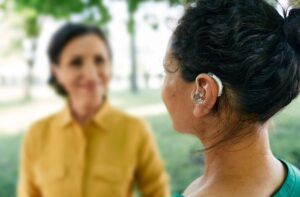
But is hearing loss reversible?
It depends. Some forms of hearing loss can be treated with full hearing restored. In other cases, the damage is permanent, and hearing can only be restored with mechanical aid.
Let’s take a look at various forms of hearing loss and if you can expect to recover.
Ear Wax Buildup: Ear wax helps clean and protect your ears, and it normally clears away on its own. It can, however, either build up naturally or be pushed and compacted deep into the ear by using cotton swabs.
When wax gets pushed deeper into the ear and accumulates, it can cause some hearing loss.
This type of hearing loss is reversible and easily treatable. A few drops of baby or mineral oil can help the wax come out, or you can purchase drops from the store to help soften the wax.
Ear Infections: Ear infections can cause mild hearing loss, making things sound as if you were wearing ear plugs.
Infections are generally caused by fluid buildup in the ear, creating an environment for bacteria to grow. In most cases, these infections will get better on their own, and in other cases, you may need to have your ear flushed and run a course of antibiotics.
In any event, full hearing will likely be restored.
Sudden Hearing Loss: Sometimes, a person will suddenly lose part or all of their hearing. It is generally the result of a specific condition, and those who have it will usually regain full hearing within a week or two. There are also some treatments that help.
Age-Related Hearing Loss: Age-related hearing loss, unfortunately, is irreversible. It’s also a very common cause of hearing loss as ear hairs can become damaged over time and continued exposure to noise.
Hearing aids, however, can help. These devices – which have come a long way in recent years – can allow you to keep hearing, communicate, and stay socially engaged.
If you’re struggling with hearing, talk to your doctor about why and what your options are.